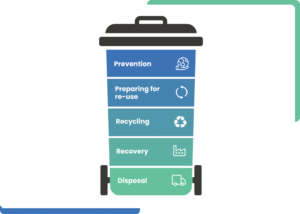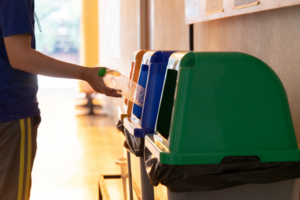DEFRA (Department for Environment, Food & Rural Affairs) set out their Waste and Resource strategy as part of the Environment Bill in 2018 to simplify waste collections across homes and businesses, increase the recycling rate to 65%. Plans will soon be unveiled, making it mandatory for UK businesses to separate their food waste from other types of waste.
There are also plans to look at deposit return schemes and new rules on recycling plastics, but the potential changes to the way businesses handle their food waste is likely to have the biggest impact, purely due to the number of businesses that will be affected.

We appreciate that this change will be significant for many of our customers, so have reviewed the proposals and have answered your questions, to help you plan for the future.
Will my business be affected by the changes to food waste legislation?
Highly likely, yes. Households have been segregating their food waste using kitchen caddies for a while now, and DEFRA would like all UK businesses to do the same.
All businesses will generate food waste. Just think about all those tea bags, coffee granules, leftover sandwiches, fruit peel, kitchen trimmings and uneaten prepared food. Currently, the aforementioned food items end up either in food or general waste bins, but under this new legislation, segregation will be mandatory. Other businesses that may be more significantly impacted include:
- Hospitality
- Pubs, bars and restaurants
- Hotels
- Takeaways
- Conference centres
- Sporting facilities
- Public institutions
- Hospitals
- Schools
- Prisons
- Any other business where food is manufactured or produced
Why are these changes to food waste legislation being introduced?
As part of the Waste and Resource Strategy announced by the Government in 2018, they held a consultation process to understand the needs and desires of individuals and stakeholders. The findings showed there was widespread support from both individuals (94%) and stakeholder respondents (90%) for the segregation and recycling of food waste.
As with any waste hierarchy, emphasis will always be placed on preventing excess and waste at the source. Redistribution of leftover supplies to food banks and charities will come next, but where this cannot be achieved then recycling and recovery will be the preferred measures.

Food waste biodegrades, so why can it not go to landfill?
As food biodegrades, it releases methane – a greenhouse gas over 20 times more potent than carbon dioxide at trapping heat within the atmosphere, contributing to climate change’s effects. Something which we are all actively seeking to avoid. There are much better ways that food waste can be disposed of.
How does Printwaste treat the food waste that they collect?
Anaerobic digestion is the best environmental outcome for food waste that cannot be prevented or redistributed. It provides both low-carbon renewable energy and digestate, which can be used as fertiliser, compost, or soil improver. This is the solution that we use at Printwaste.
When will this new legislation be brought into effect?
The finer details of what is expected are due soon, but the new rules will likely be formally introduced in 2023/24. We want to raise awareness of the potential changes so that businesses can start to consider how the legislation will affect them and what changes are required for compliance, before they are forced to do so.
How will these changes affect my costs?
Food waste is generally quite heavy, so if you are disposing of food waste in your general waste bins it will be adding to the tonnage of those bins and therefore costing you more. Once removed, your general waste bins will become much lighter. If you continue to place food waste in general waste, you will also likely incur heavy penalties in Landfill Tax charges.
Segregated food waste is up to five times cheaper to dispose of per kilo, than general waste. So not only will your general waste bins be lighter, but you will also pay a significantly reduced fee for the food waste that you do produce.
We can work with your business and carry out an audit to determine the best way to approach your food waste collections, this may be a fortnightly collection or the installation of a practical and logistically beneficial food waste containers on site.
How do I encourage my employees to support this change?
Many of us will are used to segregating our food waste at home, in reality this change is no different and from the initial consultations, many employees will actively embrace it. As with all change, it will be important for employees to understand why the change is being brought into effect, how their actions can help the business (and wider environment) and to make the changes as easy as possible to implement. We can support you with staff engagement as well as undertaking a full review of all waste streams to ensure that your waste management is delivering high performance operationally and environmentally.

What will happen if I don’t make the required changes?
The full details regarding the changes have not yet been made, but we will support all of our customers as much as we can so that the changes that need to be made, can be with as little disruption as possible. We will update our customers as soon as we are made aware.
If you’d like to know more or book a consultation with one of our team please contact us on 01242 588600, email your account manager or info@printwaste.co.uk

